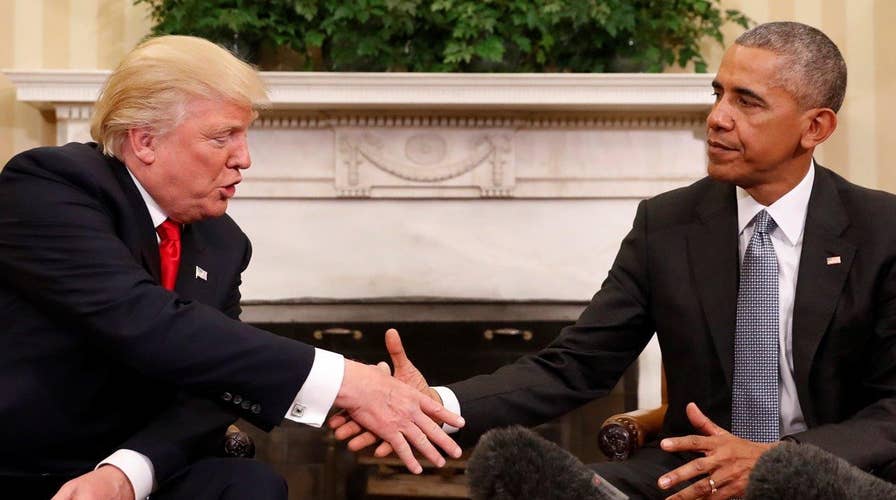President Obama, President-elect Trump meet at White House
The president and the president-elect discussed foreign and domestic policy, challenges
President Obama hosted President-elect Donald Trump at the White House for their first formal meeting Thursday, as the outgoing president and the CEO poised to replace him sought to set aside their many differences and chart a peaceful transition of power in January.
Obama called their discussion "excellent" and "wide-ranging," while stressing the need to "come together" to face common challenges.
Trump called the meeting a “great honor” and said he looked forward to talking with Obama “many, many more times.”
“I could have gone a lot longer,” Trump told reporters of the 90-minute meeting, which originally was planned as a brief sit-down. “We discussed a lot of different situations – some wonderful and some difficulties.”
It was the first time the president and the president-elect have met face-to-face.
Trump also met with Republican leaders on Capitol Hill including House Speaker Paul Ryan and Senate Majority Leader Mitch McConnell.
Trump told reporters they spoke about immigration, health care and “big-league jobs.”
When a reporter asked if he would ask Congress to ban Muslims -- a reference to his primary campaign pledge, since revised, to suspend Muslim immigration -- Trump said, "Thank you everybody," and walked away.
Earlier at the White House, many anticipated an awkward first meeting between the outgoing and incoming president. Trump was behind the “birther” controversy where he questioned the citizenship of Obama. Trump also ran on a platform that included repealing and replacing Obama’s signature health care law – the Affordable Care Act. The Republican president-elect, who will govern with Congress fully under GOP control, also has vowed dismantle the landmark nuclear accord with Iran.
For his part, Obama aggressively campaigned for Hillary Clinton and against Trump in the weeks leading up to the election.
Obama, though, vowed Wednesday and again Thursday to do everything he can to facilitate a peaceful and orderly transition.
First lady Michelle Obama met with Melania Trump privately in the White House residence, while Vice President Joe Biden prepared to see Vice President-elect Mike Pence later Thursday.
Trump traveled to Washington from New York on his private jet, breaking with protocol by not bringing journalists in his motorcade or on his plane to document his historic visit to the White House. Trump was harshly critical of the media during his campaign and for a time banned news organizations whose coverage he disliked from his events.
As scores of journalists waited to be admitted to the Oval Office to see Obama and Trump together, they saw White House chief of staff Denis McDonough walking along the South Lawn driveway with Jared Kushner, Trump's son-in-law. A handful of Trump aides trailed them.
The show of civility at 1600 Pennsylvania Avenue contrasted with postelection scenes of protests across a politically divided country. Demonstrators from New England to the heartland and the West Coast vented against the election winner on Wednesday, chanting "Not my president," burning a papier-mache Trump head, beating a Trump pinata and carrying signs that said "Impeach Trump."
Republicans were emboldened by Trump's stunning victory over Hillary Clinton, giving the GOP control of the White House and both chambers of Congress.
"He just earned a mandate," Ryan said.
In an emotional concession speech, Clinton said her crushing loss was "painful and it will be for a long time" and acknowledged that the nation was "more divided than we thought."
Still, Clinton was gracious in defeat, declaring: "Donald Trump is going to be our president. We owe him an open mind and the chance to lead."
In Washington, Trump's scant transition team sprang into action, culling through personnel lists for top jobs and working through handover plans for government agencies. A person familiar with the transition operations said the personnel process was still in its early stages, but Trump's team was putting a premium on quickly filling key national security posts. The person was not authorized to discuss details by name and spoke on condition of anonymity.
According to an organizational chart for the transition obtained by The Associated Press, Trump was relying on experienced hands to help form his administration. National security planning was being led by former Michigan Rep. Mike Rogers, who previously worked for the FBI. Domestic issues were being handled by Ken Blackwell, a former Cincinnati mayor and Ohio secretary of state.
As president-elect, Trump is entitled to get the same daily intelligence briefing as Obama -- one that includes information on U.S. covert operations, information gleaned about world leaders and other data gathered by America's 17 intelligence agencies. The White House said it would organize two exercises involving multiple agencies to help Trump's team learn how to respond to major domestic incidents.
The Associated Press contributed to this report.












































